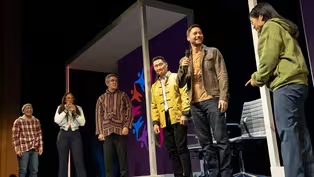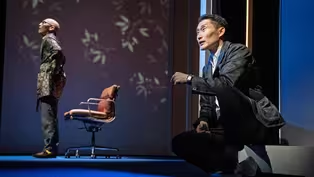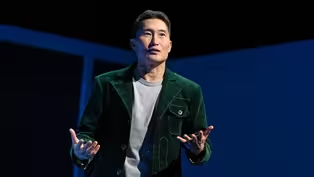
Behind the Curtain of "Yellow Face"
Clip: Season 52 Episode 16 | 8m 42sVideo has Closed Captions
Go behind the curtain of "Yellow Face" with the cast and creative.
Go behind the curtain of the Tony nominated play "Yellow Face" with the cast and David Henry Hwang.
Problems playing video? | Closed Captioning Feedback
Problems playing video? | Closed Captioning Feedback
Major series funding for GREAT PERFORMANCES is provided by The Joseph & Robert Cornell Memorial Foundation, the Anna-Maria and Stephen Kellen Arts Fund, the LuEsther T. Mertz Charitable Trust, Sue...

Behind the Curtain of "Yellow Face"
Clip: Season 52 Episode 16 | 8m 42sVideo has Closed Captions
Go behind the curtain of the Tony nominated play "Yellow Face" with the cast and David Henry Hwang.
Problems playing video? | Closed Captioning Feedback
How to Watch Great Performances
Great Performances is available to stream on pbs.org and the free PBS App, available on iPhone, Apple TV, Android TV, Android smartphones, Amazon Fire TV, Amazon Fire Tablet, Roku, Samsung Smart TV, and Vizio.
Buy Now
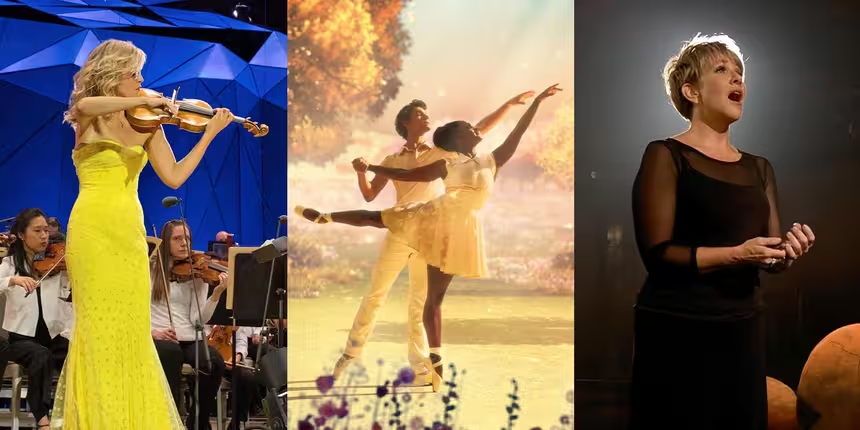
Great Performances Newsletter
Subscribe to the Great Performances newsletter to keep up with the latest full episodes to stream, exclusive content, and more!Providing Support for PBS.org
Learn Moreabout PBS online sponsorship-The one thing that's unique about live performance as an art form is that you experience it with the group of people in the room that night.
And once it's gone, it's gone forever.
What's nice about "Great Performances" is that it gets to live on.
And instead of something that's ethereal, it becomes something that's memorialized in the way that TV and film are.
And to be able to bring this story to a wider audience is incredibly meaningful because not only am I proud of the show and the work that we're all doing, but I'm proud of what the show is trying to say.
And especially at the time that we're living in now, any kind of art that helps encourage understanding among one another and brings us closer together as a society is really important.
And that's what this show was doing, and I would love for as many people as possible to see it.
♪♪ -This will be my ninth Broadway production.
However, if you look at the history of Asians on Broadway, think of a show with Asians, and chances are, um, they are Asians playing foreigners.
They're not playing Americans.
Um, and whether that's "South Pacific" or "Miss Saigon" or whatever.
And of my shows, this is also the first play that I've ever had on Broadway with Asian American characters.
And that's incredibly important to me.
To have this opportunity to highlight an AAPI story on Broadway, the most visible stage in America and maybe the world, is incredibly gratifying.
And I'm so honored to be doing this with both of you.
-Yeah, and I would say, like, you know, the idea of what you're saying is embodied in me doing this play.
You know, I remember whenever I would watch, like, award shows and speeches and actors would say things like, "I couldn't ever imagine that I would be up here."
And I thought to myself, "Wow.
I imagine it all the time."
-[ Laughs ] -But I never thought that it would happen.
-Right.
-You know, because of the very thing you're talking about.
When I started my career, I would see the shows on Broadway.
I would never see people like me up there, except if it was classical theater, where the casting was different.
But the kinds of shows that got put up were never representative of my experience in any way, so it felt very much limited to my imagination.
And I love comedy.
I've never been able to do comedy in the way that I'm able to do it here.
Combine that with how strongly I feel about these issues of representation and inclusion, it felt right.
-I think it is a really, really important play at this time.
And, also, I think comedy is hard, and I'm really proud that all of the plays that I've done on Broadway are comedies.
And I think, for women in particular, that is really exciting and not common.
So I feel very personally proud in that way and also enormously honored to stand with the two of you in this moment, in this season, with this play.
-Hm.
-We all had some pretty deep and extensive conversations about how to cast this play, um, and trying to do so as mindfully as possible.
And during the original "Miss Saigon" fight, um, people who were supporting, uh, Jonathan Pryce's right to play the Eurasian engineer would make the argument, "Well, it's acting.
You know?
It's just acting."
Which is, um, you know, not accurate because it neglects some kind of institutional, um, biases and the way in which the system was set up to give white actors the opportunity to play a lot of other parts and not others.
But it's not entirely wrong, that argument, either, the idea that it's just acting.
So I think in this version, we decided we wanted to push that envelope a little and have people of color playing other people of color.
-And, yeah, because we have so many real-life people inside of our show.
And I think part of the fun for me in both the casting and also in the approach to the production has been how to capture the essence of someone without trying to portray them exactly.
So we have Marinda Anderson playing Margaret Cho, which I think is one of our most delicious, tantalizing experiments inside of the play in terms of what can casting do and why.
[ Cheers and applause ] -You know, I come out in this "King and I" outfit, and, you know, there's this appropriating that's happening.
And -- But then there's also this sort of subtle something underneath it where it's a guy, like, finding himself.
[ Laughter ] Daniel and I have gotten to play these scenes together, which have been just fun and funny and then, you know, at times scratching the surface of sort of our shared humanity underneath, which I think is what the show ultimately is after.
[ Telephone rings ] -Hello?
-Hello, son!
-Hi, Dad!
-I was just calling to see how you're doing.
-I gotta say, one of the kindest and one of the only things David told me about his dad was that he stood tall and that when he walked into a room, he was the star of that room.
Even when he was in the room.
[ Laughs ] So I've used that to extrapolate along with the actual script.
-And I'm a playwright!
Nice to meet you.
-Well, I will say that, you know, it was very liberating and freeing when David said, "You don't have to do an impression of me."
-Yeah.
-And I was glad about that.
Because, you know, what I think -- I think what we all agreed was the core of the character was these personality traits that he had, the amount of ego that he had, the -- the obstacles that he had to actually being open and honest about who he is.
And that is something that I think we can all relate to, and I think focusing on that really unlocked the character.
-After all, I was a respected figure in the community -- the first Asian playwright to have a play produced on Broadway.
-Yeah, I mean, there are ways in which the DHH character is me, and there are ways in which he's not me, and so therefore just to do an impersonation didn't feel right.
And also I just want you to be as good-looking as you are, which just, you know, shines well on me, so... -I think that David -- Even David's character in the play says that any writer, to some extent, their work is semi-autobiographical.
And there's a lot in this play that actually happened.
Um, there are a lot of real people populating this play.
And so part of the fun of the play is trying to figure out what's real and what's not.
Um, ultimately, I think the play deals in, um, the question, you know, what is truth?
What's authentic?
What -- You know -- Can we trust the media to tell us what's true when it is just people telling stories?
-Dad!
The newspaper article!
-Right.
Right.
-Talk to your father!
-Did you see the part when he called me "short"?!
I'm 5'10"!
That's not short!
-I know.
-He called me short!
You know what that means?
The guy's a racist!
-Dad!
What's really important... -One of the things I'm proudest about with this show is that it brought people into the theater that -- that have never been before.
I can't tell you the number of times people have said to me backstage or at the stage door, "This is the first Broadway show I've ever seen."
And when that -- When I hear that, it warms my heart, especially when they're Asian American.
Because traditionally Asian Americans have not have had stories told about them, about us.
And so to have a story that brings them into the theater and engages them in a whole new way in this art form is incredibly meaningful.
[ Cheers and applause ] -Let's go!
-For 50 years, it feels good to be Great.
The Awkward Talkback from "Yellow Face"
Video has Closed Captions
Clip: S52 Ep16 | 5m 1s | DHH (Daniel Dae Kim) brings Marcus G. (Ryan Eggold) to a talkback. (5m 1s)
DHH Calls His Father in "Yellow Face"
Video has Closed Captions
Clip: S52 Ep16 | 3m 9s | DHH (Daniel Dae Kim) shares a phone call with his father. (3m 9s)
Video has Closed Captions
Preview: S52 Ep16 | 30s | Enjoy Tony winner David Henry Hwang’s Broadway comedy starring Daniel Dae Kim. (30s)
Providing Support for PBS.org
Learn Moreabout PBS online sponsorship

- Arts and Music
The Best of the Joy of Painting with Bob Ross
A pop icon, Bob Ross offers soothing words of wisdom as he paints captivating landscapes.











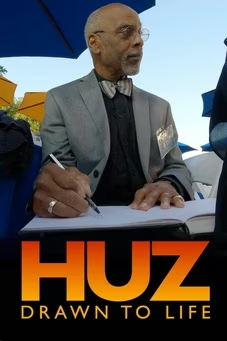
Support for PBS provided by:
Major series funding for GREAT PERFORMANCES is provided by The Joseph & Robert Cornell Memorial Foundation, the Anna-Maria and Stephen Kellen Arts Fund, the LuEsther T. Mertz Charitable Trust, Sue...
